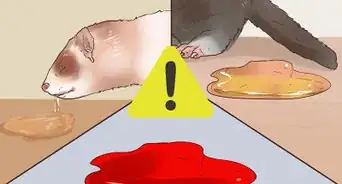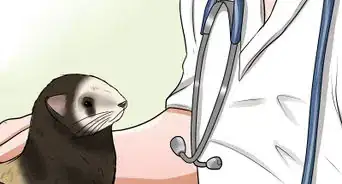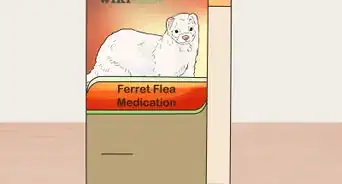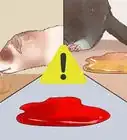This article was co-authored by Ryan Corrigan, LVT, VTS-EVN. Ryan Corrigan is a Licensed Veterinary Technician in California. She received her Bachelor of Science in Veterinary Technology from Purdue University in 2010. She is also a Member of the Academy of Equine Veterinary Nursing Technicians since 2011.
There are 10 references cited in this article, which can be found at the bottom of the page.
This article has been viewed 20,153 times.
If your ferret has an upper respiratory infection, don’t worry -- there are lots of things you can do to help your furry friend. In most cases, you don’t need to do much of anything, since respiratory infections often end on their own. Your ferret might need help sniffing out its food before mealtimes, though, so wipe its nose and warm its food. If your ferret is still sick after several days, take it to the vet for diagnosis and treatment.
Steps
Treating the Infection
-
1Wait for your ferret to recover. In most cases, upper respiratory infections disappear in a few days. Give your ferret time to rest and heal. Don’t try to train or play with your ferret when it is suffering from an upper respiratory infection.[1]
-
2Wipe your ferret’s nose before meals if it is runny. If your ferret’s nose is runny, it will not be able to smell its food and will have a hard time swallowing. Use a soft, clean tissue or paper towel to wipe your ferret’s nose before feeding it.[2]
- Wash your hands after wiping your ferret’s nose.
Advertisement -
3Wet and warm your ferret’s food before mealtime. To entice your ferret to eat, add a bit of water to your ferret’s favorite pelleted food. Mix the wet food until it turns to a sludgy mush. Microwave the mash for about 30 seconds. Serve it to your ferret while it’s still warm.[3]
- Wetting and warming the food in this way will give it a stronger odor.
- To make the food even more tasty, mix it with chicken broth instead of water.
-
4Take your ferret to the vet if the infection lasts more than a few days. If your ferret continues to demonstrate symptoms of an upper respiratory infection after a few days, the infection might be more than your ferret’s immune system can handle. Alternately, your ferret might not have an upper respiratory infection at all, but another medical condition that also requires veterinary care.[4]
- Before taking your ferret to the vet, call your veterinary clinic. Inform them of your ferret’s symptoms and provide details about when the symptoms started. Your vet will also want to know if they’ve gotten worse or changed in any way.
-
5Allow the vet to provide fluid therapy and nutritional support. In some extreme cases, your ferret’s health is so compromised that it will require fluid therapy via an intravenous (IV) tube. This treatment typically occurs alongside nutritional support (force feeding). Your vet will regulate and monitor the fluid therapy and nutritional support regimen if they are necessary.
- Your ferret will need to stay at the veterinary clinic for as long as the fluid therapy and nutritional support is required.
- Only the vet should give fluid therapy and nutritional support. Do not try to do it yourself at home.
-
6Give your ferret antibiotics. If your vet decides that your ferret needs medicine, they will provide antibiotics (drugs that helps fight infections). The amount of time your ferret will need to take the antibiotics depends on your ferret’s condition. The schedule you use to administer antibiotics, too, depends on your ferret’s health.[5]
- Most antibiotics are in pill form. Your vet will provide specific directions for use, but you’ll probably crush the pill into a powder and mix it into your ferret’s food.
- Continue to give the full course of antibiotics to your ferret. Do not stop early, even if you think the ferret looks or acts better.
-
7Place your ferret in an oxygen chamber. An oxygen chamber or oxygen tent is a small, sealed chamber in which the air and conditions are carefully managed. In some extreme cases, your vet might place your ferret in the oxygen chamber to protect it from an aggressive respiratory infection.[6]
- Your ferret will not be able to return home while it is in an oxygen chamber. Your vet will care for it while it recovers at the clinic.
Preventing Infections
-
1Get your ferret vaccinated. Talk to your vet about your options for vaccinating your ferret against upper respiratory infections like Bordetella and canine distemper virus.[7]
-
2Stay away from your ferret if you’re ill. Some upper respiratory infections can spread between humans and ferrets. Protect your ferret’s health by having a friend or family member take on some of your ferret care tasks. If that’s not possible, limit your contact with your ferret as much as possible until you’re well again.[8]
- To further limit the spread of infection, wear a face mask around your ferret and wash your hands thoroughly after handling it.
-
3Avoid boarding your ferret. Ferrets that spend time in animal boarding facilities or veterinary clinics are usually exposed to other animals and suffer at least some level of stress. These conditions are ripe for an upper respiratory infection to take hold in your ferret.[9]
- Instead of boarding your ferret, ask a friend or family member to care for it while you are away.
-
4Don’t smoke near your ferret. Like humans, ferrets are sensitive to smoke. Smoking near your ferret will increase its likelihood of developing an upper respiratory disease, so smoke outside or quit altogether.[10]
-
5Don’t use scented bedding. Some ferret litter is scented with pine or other artificial scents. These artificial scents can sometimes irritate your ferret’s respiratory tract. For the same reason, if your ferret sleeps on a blanket or soft pet bed, don’t wash it with scented laundry detergent or fabric softener.[11]
Identifying Symptoms
-
1Look for nasal discharge. Like people, ferrets that contract upper respiratory illnesses may get a runny nose. You might notice that your ferret’s nostrils are clogged or dripping mucous.[12]
-
2Listen for coughing or sneezing. Your ferret might cough or sneeze due to nasal blockage or to irritation of its lungs. Sneezing alone is not a sign of sickness, as ferrets sneeze fairly often. If the ferret is sick, sneezing and coughing may be joined by other symptoms, such as inactivity or a lack of appetite.[13]
-
3Pay attention to any difficulty with breathing. If your ferret wheezes or struggles to breathe, take it to the vet as soon as possible. It could be a respiratory infection, but this is also a sign of more serious conditions, such as heart disease.
-
4Look for discharge from the eyes. If your ferret has yucky goo streaks in the corners of its eyes, it could be a sign of an upper respiratory infection.[14]
- The eyes might also appear to have a gloss over them, or appear swollen.
-
5Monitor your ferret’s behavior. If your ferret suddenly seems tired, depressed, and disinterested in play, it might be suffering from an upper respiratory infection. They may try to hide or stay out of view. Another sign that your ferret is unhealthy is an uncharacteristic irritability.[15] Finally, your ferret might eat less if it has an upper respiratory infection.[16]
-
6Recognize the symptoms of canine distemper. Canine distemper is fatal for ferrets, so you should get your ferret to the vet immediately if you believe it has canine distemper. While most of the symptoms are identical to those of other upper respiratory diseases, canine distemper will harden your ferret’s footpads.[17]
- Gently lift one of your ferret’s footpads and compare it against that of a healthy ferret, or against your memory of how your ferret’s footpads normally feel.
- If the pad feels hard, it probably has canine distemper, and needs medical attention.
- Another symptom is thick, yellow-green discharge coming from the nose.
- Other symptoms that could indicate canine distemper include vomiting and diarrhea (especially diarrhea that appears black and tarry).
References
- ↑ http://www.peteducation.com/article.cfm?c=11+2071&aid=565
- ↑ http://www.peteducation.com/article.cfm?c=11+2071&aid=565
- ↑ http://www.peteducation.com/article.cfm?c=11+2071&aid=565
- ↑ http://www.peteducation.com/article.cfm?c=11+2071&aid=565
- ↑ https://www.petcha.com/the-ferret-respiratory-system/
- ↑ https://vcahospitals.com/know-your-pet/ferrets-respiratory-disease
- ↑ http://www.peteducation.com/article.cfm?c=11+2071&aid=565
- ↑ http://www.peteducation.com/article.cfm?c=11+2071&aid=565
- ↑ http://www.peteducation.com/article.cfm?c=11+2071&aid=565
- ↑ https://www.ncbi.nlm.nih.gov/pmc/articles/PMC5033751/
- ↑ http://www.cypresskeep.com/Ferretfiles/Diseases-FM.htm
- ↑ https://vcahospitals.com/know-your-pet/ferrets-respiratory-disease
- ↑ https://vcahospitals.com/know-your-pet/ferrets-respiratory-disease
- ↑ https://vcahospitals.com/know-your-pet/ferrets-respiratory-disease
- ↑ https://vcahospitals.com/know-your-pet/ferrets-respiratory-disease
- ↑ https://www.petcha.com/the-ferret-respiratory-system/
- ↑ https://vcahospitals.com/know-your-pet/ferrets-respiratory-disease
About This Article
To determine if your ferret has an upper respiratory infection, watch for coughing, sneezing, nasal discharge, difficulty breathing, and lethargy. If your ferret displays any of these symptoms, wait a few days to see if they go away on their own. In the meantime, wipe your ferret's nose before meals if it's runny, and warm up its meals in the microwave for 30 seconds to entice it to eat. However, if your ferret's symptoms don't go away after a few days, it's important that you take it to see a vet so they can figure out what's going on. For advice from our Veterinary co-author, like how to prevent upper respiratory infections in ferrets, read on.



































































